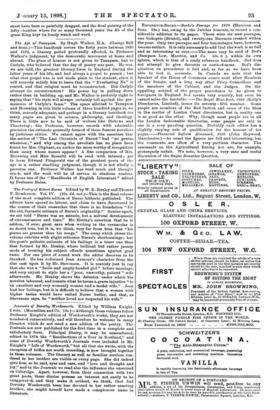The Age of Tennyson. By Hugh Walker, MA. (George Bell
aud Sons.)—This handbook covers the forty years between 1830 and 1870, a literary period profoundly affected, in Professor Walker's judgment, by the democratic movement at home and abroad. The place of honour is not given to Tennyson, but to Carlyle, who believed that the day of poetry was past. He was, we are told, the greatest literary force in England during the latter years of his life, and had always a gospel to preach ; but what that gospel was is not made plain to the student, since it will scarcely satisfy him to learn that the "Everlasting No " is routed, and that religion must be reconstructed. Did Carlyle attempt its reconstruction ? His power lay in pulling down rather than in building up, and Mr. Walker is probably right in saying that "his style will always certainly tell against the per- manence of Carlyle's fame." The space allotted to Tennyson and Browning in this little volume of three hundred pages is, we think, scarcely adequate, and perhaps in a literary handbook too many pages are given to science, philosophy, and theology. There is little new to be said of writers like Dickens and Thackeray ; the Professor, however, records with admirable precision the estimate generally formed of these famous novelists by judicious critics. We cannot agree with the assertion that the author of " The Last Chronicle of Barset " had "no genius whatever;" and why among the novelists has no place been found for Mrs. Oliphant, an author far more worthy of recognition -than many whose names appear ? A fine comparison of Mrs. Browning and Miss Rossetti will be read with interest ; yet to term Edward Fitzgerald one of the greatest poets of tin. age is a rather startling judgment, though it is not wholly a perverse one. Professor Walker has read much and thought much, and the work will be of service to studious readers. It forms one of the "Handbooks of English Literature" edited by Professor Hales.


































 Previous page
Previous page